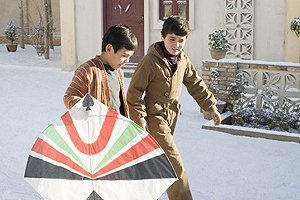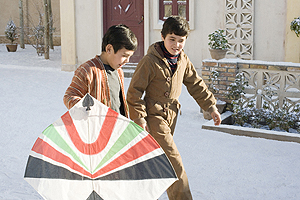LITTLE ROCK — Marc Forster's The Kite Runner is a sincere if somewhat remote retelling of Khaled Hosseini's popular 2003 novel of childhood cowardice and adult atonement. If you love the book, you'll like the movie. If you haven't read the book, you might love it.
Hosseini's novel - to which the film is extraordinarily faithful - tells the story of fortunate son Amir, a wealthy Pashtun boy from Kabul, shamed by his failure to defend his boyhood friend Hassan, the son of his father's Hazara servant, during an attack by older boys. Amir later flees the country with his father on the eve of the Soviet invasion of Afghanistan and eventually becomes a novelist living in California. When he receives a call from his father's former business partner, Amir decides to return to his home country - now controlled by the Taliban - to try to rescue Hassan's son from a brutal "orphanage."
Movie
The Kite Runner ******** 1/2
The end of Afghanistan's monarchy and the rise of the Taliban are seen through the eyes of a young boy. With Wali Razaqi, Said Taghmaoui, Shaun Toub, Nasser Memarzia; directed by Marc Forster. Partially subtitled.
Originally scheduled for release in November, the film was delayed in part due to concerns for the safety of the boys who play young Amir and Hassan in the film. That may be a lucky thing for it allowed local moviegoers the chance to see Charlie Wilson's War which - although it avoids any mention of Osama bin Laden - provides a primer on exactly how those Taliban guys came to power, and Joe Wright's similarly careful literary adaptation Atonement, in which another haunted novelist finds an altogether different way to expiate guilt.
It's not hard to see The Kite Runner as a cousin to Atonement, and not just because they're both award-seeking adaptations of big novels about troubled consciences. Forster's Swiss-German technique is as buttoned-down and precise as Joe Wright's to the point that we just assume that the phony-looking beard the adult Amir (Khalid Abdalla) adopts at one point is meant to be phonylooking. The soaring kite flying sequences are supposed to look a little fantastic and apart from the rest of the film because they represent an escape from the tedium of constant oppression. There's nothing in the frame Forster does not consider, vet and tune.
The result is probably more interesting to think about than itis to watch unfold on the screen - although if you don't know Amir's story, you'll likely be captivated. Although Ian McEwan's novel Atonement is a better book than Hosseini's, The Kite Runner is a better story.
McEwan'swork is tricky meta-fiction that raises questions about the reasons we tell stories, while Hosseini is an unaffected storyteller who doesn't worry that the pot'sboiling over.
The Kite Runner is a curiosity in that it is a film driven almost entirely by its story, to the point that all the actors - save the fiercely patriarchal Homayoun Ershadi as Amir's father- seem purely functional, if not negligible.
That goes for the two young actors - Zekeria Ebrahimi and Ahmad Mahmidzada - who play young Amir and Hassan, respectively. Forster has a reputation for coaxing fine performances out of children, and these kids do themselves no dishonor here. But there's a bland PBS quality to the drama. Forster - who has proved himself a versatile and at times highly inventive director with Monster's Ball, Finding Neverland, Stranger Than Fiction and the extremely visual but perceived failure Stay - plays this one straight down the middle.
The Kite Runner is like a championship football team that honors the fundamentals, that blocks and tackles and manages the clock. It's a winner and a little boring.
MovieStyle, Pages 39, 44 on 01/11/2008

